Jonas Mekas. Cinema Is Young!

Dal 15 April 2023 al 23 July 2023
Milano
Luogo: Cineteca Milano - MIC Museo Interattivo del Cinema
Indirizzo: Via Fulvio Testi 121
Orari: da martedì a domenica dalle 15.00 alle 19.00
Curatori: Francesco Urbano Ragazzi
Costo del biglietto: Intero: € 9 Ridotto: (Cinetessera*, studenti universitari, under 14) € 7,00 Family: € 5,00 (valido per un nucleo familiare composto da minimo 3 persone tra cui un under 14) Solo i martedì ridotto con Carta Fidaty € 6,00 L’ Abbonamento Musei Lombardia dà diritto all’ingresso gratuito fino alle ore 19.00 (eventi speciali fuori da questi orari non rientrano nella gratuità dell’Abbonamento) *Cinetessera 2023 (valida fino a Dicembre 2023). Modalità di accesso alle proiezioni Rassegna "Cinema is Young
Telefono per informazioni: +39 02.87242114
E-Mail info: info@cinetecamilano.it
Sito ufficiale: http://www.cinetecamilano.it
Più che una mostra, Cinema is young! è il punto di arrivo di un percorso itinerante che ha attraversato la penisola da Roma a Napoli, passando per Bologna, Pesaro e Venezia. È inoltre, secondo le parole dei curatori, il capitolo finale di una trilogia dedicata all’artista: «Se la mostra appena conclusa al Mattatoio di Roma aveva un carattere retrospettivo e quella al Padiglione dell’Esprit Nouveau di Bologna si concentrava sul simbolo dell’albero, il progetto che abbiamo pensato per la Cineteca di Milano ha l’obiettivo di evidenziare la posizione di Mekas nella storia del cinema occidentale».
Allestita nelle sale del MIC - Museo Interattivo del Cinema, la mostra enfatizza la natura allo stesso tempo cinematica, educativa e relazionale dello spazio espositivo. Una selezione di film, video, serie fotografiche e documenti che esemplificano la settantennale produzione del regista sono esposti all’interno della vasta collezione dell’istituzione milanese. L’opera di Mekas è presentata così come un punto nodale nel percorso che dalle origini del cinematografo si spinge verso le nuove frontiere del digitale.
Quello di Mekas è un cinema personale. Nei film dell’artista la macchina da presa diventa un diario in cui l’autore registra, giorno dopo giorno, i frammenti di intensità della propria esistenza. Ogni attimo è restituito in un montaggio che sfugge alla narrazione lineare per avvicinarsi al linguaggio della poesia. Questo incessante filmare non ha tuttavia un carattere intimista. È piuttosto un esercizio di meditazione su di sé che raggiunge una dimensione politica. Mekas usa la sua cinepresa Bolex per radicarsi in una metropoli in cui vive da esule. Arriva infatti a New York da profugo nel 1949, assieme al fratello Adolfas, dopo aver vissuto l’occupazione sovietica della Lituania, la detenzione in un campo di lavoro nazista a Elmshorn, e la permanenza per quattro anni nei campi profughi di Wiesbaden e Kassel.
Vivere filmando diventa per Mekas un modo di stare al mondo. Il nuovo senso di appartenenza che l’artista trova nel cinema lo spinge non solo a realizzare circa cento film, ma anche a fondare alcune delle istituzioni che hanno permesso la diffusione e conservazione del cinema indipendente: la rivista Film Culture (1954), la cui collezione completa è esposta in mostra, la Film-makers Cooperative (1961) e gli Anthology Film Archives (1970). È inoltre grazie a questo doppio ruolo di artista e organizzatore che Mekas diventa l’anello di congiunzione tra le avanguardie americane del dopoguerra: dalla Factory di Andy Warhol al movimento Fluxus di George Maciunas, Shigeko Kubota e Yoko Ono, dalla musica dei Velvet Underground alla poesia della Beat Generation.
Cinema Is Young! inscrive questa parabola formidabile in un ampio orizzonte storico, consentendo di cogliere una serie di legami non solo con artisti e cineasti della stessa generazione di Mekas, ma anche con coloro che lo hanno preceduto e seguito. Da un lato, la mostra racconta la frenesia degli Anni ’60 e ’70 in cui nasce il New American Cinema Group, la nouvelle vague americana che si oppose a Hollywood e alla sua industria. Dall’altro lato, insegue l'artista nella sua produzione più recente, che abbraccia con naturalezza l'avvento del digitale, prefigurandone gli sviluppi. Così accade ad esempio nell’installazione su dodici schermi Dedication to Fernand Léger, presentata per la prima volta in Italia, che unisce le origini del cinema d’avanguardia e la tecnologia video nel sogno di realizzare un film lungo ventiquattr’ore.
Cinema Is Young! celebra l’eterna giovinezza del cinema di Jonas Mekas. Un cinema che si produce al ritmo della vita e che senz’altro ha anticipato quest’epoca in cui ognuno ha una telecamera in tasca. Un cinema che, come dice Mekas nel suo Anti-100 Years of Cinema Manifesto, nasce daccapo a ogni nuovo ronzio della macchina da presa, a ogni nuovo ronzio del proiettore.
Per tutto il periodo della mostra, Cinema Is Young! si espande anche nelle due sale della Cineteca di Milano attraverso una rassegna di film a cura di Matteo Pavesi e Francesco Urbano Ragazzi (di seguito il calendario). A una serie di proiezioni dedicate all’opera di Jonas Mekas si alterneranno titoli e autori che aiuteranno a indagare sia l’eredità dell’artista lituano che le principali innovazioni occorse nella lunga storia del cinema.
Inoltre, la Cineteca di Milano ha scelto di regalare al grande filmmaker Jonas Mekas una rassegna in 21 titoli intitolata "Per Mekas. Classici in omaggio al mondo di Jonas Mekas" che comprendono film che lo stesso regista ha conosciuto nel suo lavoro di filmmaker, a cui si è ispirato, di cui ha condiviso i temi o da cui ha addirittura preso le distanze (anche di questa rassegna trovate di seguito il calendario).
Da segnalare l'evento speciale che anticipa la mostra venerdì 14 aprile alle 20.30 al Cinema Arlecchino, dove verrà proiettato Fragments of Paradise di K.D. Davison. Vincitore del Premio per il Miglior Documentario alla Mostra internazionale d’arte cinematografica di Venezia nel 2022, il film racconta la straordinaria vita di Mekas attraverso un appassionante scavo nell’archivio dell’artista.
Vernissage Sabato 15 aprile ore 18.00
A seguire
The Brig
Jonas Mekas, tratto dall’omonimo dramma teatrale di Kenneth Brown, USA, 1964, 35MM, 60’, v.o.
Una rappresentazione ultra-realistica di una brigata del corpo dei Marines in un campo militare del Giappone nel 1957. Una denuncia ai brutali metodi dell’ambiente militare.
SCARICA IL COMUNICATO IN PDF

-
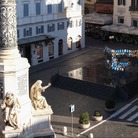 Dal 18 January 2026 al 31 May 2026
Roma | Palazzo Mignanelli
Dal 18 January 2026 al 31 May 2026
Roma | Palazzo Mignanelli
Venus
-
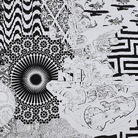 Dal 19 January 2026 al 1 March 2026
Roma | GNAMC | Galleria Nazionale d’Arte Moderna e Contemporanea
Dal 19 January 2026 al 1 March 2026
Roma | GNAMC | Galleria Nazionale d’Arte Moderna e Contemporanea
Maurizio Cannavacciuolo. Promenade
-
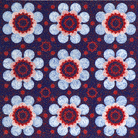 Dal 17 January 2026 al 22 March 2026
Bologna | Museo Civico Medievale
Dal 17 January 2026 al 22 March 2026
Bologna | Museo Civico Medievale
Alessandro Moreschini. L’ornamento non è più un delitto
-
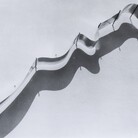 Dal 15 January 2026 al 28 February 2026
Milano | The Pool NYC | Palazzo Fagnani Ronzoni
Dal 15 January 2026 al 28 February 2026
Milano | The Pool NYC | Palazzo Fagnani Ronzoni
I tempi dello sguardo. 90 anni di fotografia italiana in due atti - Il Bianco e il Nero
-
 Dal 15 January 2026 al 15 April 2026
Milano | Palazzo Citterio | Ledwall
Dal 15 January 2026 al 15 April 2026
Milano | Palazzo Citterio | Ledwall
Debora Hirsch. Vanishing Trees
-
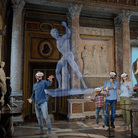 Dal 9 January 2026 al 27 February 2026
Roma | Galleria Borghese
Dal 9 January 2026 al 27 February 2026
Roma | Galleria Borghese
Sguardi oltre il tempo


